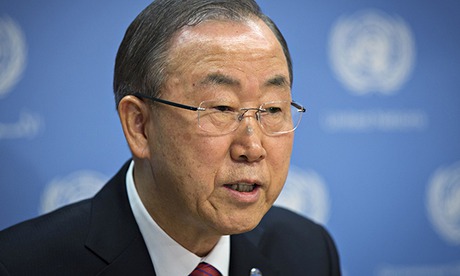
The UN secretary general, Ban Ki-moon, has backed Fahma Mohamed's campaign – which is supported by the Guardian and anti-FGM campaigners – to put education at the heart of tackling female genital mutilation. Ban praised the 17-year-old's campaign – which has now attracted more than 212,000 signatures on change.org - calling it "deeply inspiring", and applauded her call to enlist headteachers to help reach every girl who is at risk of FGM.
As a result of the campaign – which calls on the education secretary, Michael Gove, to write to every headteacher in the country asking them to inform teachers and parents about the horrors of FGM – the Scottish government has already said that it will write to heads throughout Scotland, and following sustained public pressure Michael Gove agreed to meet with Mohamed to discuss the issue.
Ban praised the move in Scotland, stepping up pressure on Gove to follow that lead. "It has been deeply inspiring for me to hear that a 17-year-old, Fahma Mohamed, supported by the Guardian, has attracted well over 200,000 signatures to her petition demanding action to end female genital mutilation," wrote Ban in a comment piece for the Guardian. "Headteachers – and governments – have a vital role to play in helping to convince families not to send their daughters abroad and help those girls, some 24,000 in the UK alone – thought to be at risk. The decision of the Scottish government to write to every headteacher asking them to train staff and educate parents is a major step forward."
Mohamed, a student from Bristol and a trustee of the charity Integrate Bristol, said she was honoured to receive Ban's support. "It's great that our campaign has had such a wide reaching impact and I'm truly honoured by Ban Ki-moon's support and praise," she said. "If he can help us persuade Michael Gove and the Department for Education that they need to act, and now, then all of us in my Integrate Bristol group would be delighted."
Ban said Mohamed was a key part of a worldwide campaign to bring an end to FGM, which is estimated to affect more than 125 million girls and women across 29 countries in Africa and the Middle East, where FGM is most prevalent. An estimated 60,000 women and girls have been victims in the UK alone.
He stressed that there was no developmental, religious or health reason to cut or mutilate girls and women, writing: "Although some would argue that this is a 'tradition', we must recall that slavery, so-called honour killings and other inhumane practices have been defended with the same weak argument. Just because a harmful practice has long existed does not justify its continuation […] FGM causes grave harm. The health consequences include depression, insecurity, pain, infections, incontinence and sometimes deadly complications in pregnancy and childbirth. Mothers shouldn't be terrified of giving birth to daughters."
The UN secretary general pointed to progress being made in Uganda, Kenya and Guinea-Bissau, which have recently adopted laws to end FGM. Arrests have been made in Ethiopia, in Sudan a campaign has been launched against FGM, while in Kenya elders have imposed a fine on anyone carrying out or abetting the practice.
Every country in Africa had sponsored the UN's international day of zero tolerance for FGM on 6 March, he said. "The effect on individuals will be profound, sparing them terrible suffering and pain. So, thank you Fahma for what you are doing to help make this happen."

